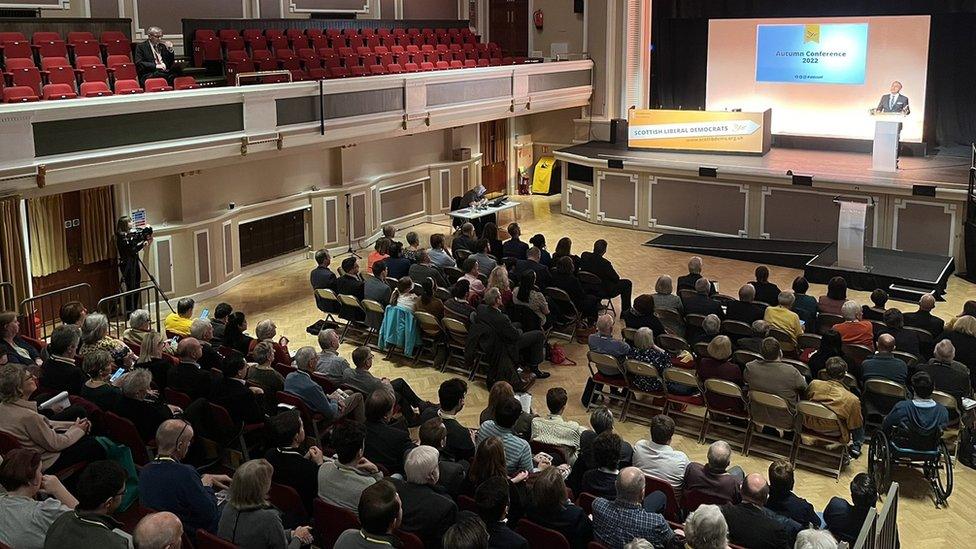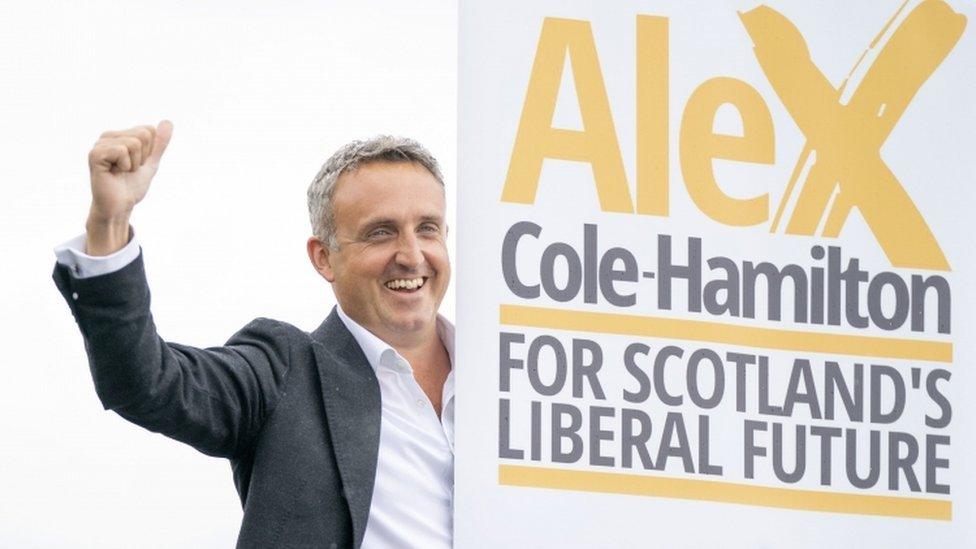Scottish Lib Dems target 150 seats at next council election
- Published
Alex Cole-Hamilton replaced Willie Rennie as leader of the Scottish Liberal Democrats in August last year
The Scottish Liberal Democrats have set a target of winning more than 150 seats at the next council elections.
The party secured 87 seats in May but leader Alex Cole-Hamilton has already identified his goal for 2027.
Mr Cole-Hamilton, who became leader last August, outlined his ambition at the party's rearranged autumn conference in Hamilton.
He told delegates: "We've identified the wards, we just need people to fill them."
Mr Cole-Hamilton said the strategy was called 150 Rising.
He said: "Rising, because 150 council seats is just the floor of our ambition.
"As new candidates emerge, as people hear our message, as we build that social contract, our ambitions will rise with our polls.
"I'm tired of fighting elections based on who we are not. It's time to be proud of who we are."
Mr Cole-Hamilton also confirmed the party's first 150 Rising action weekend will be held next month.


The Scottish Lib Dems know how to have a good time.
They kicked off the Saturday of their conference in Hamilton with a detailed debate of amendments to their constitution around leadership election rules.
It's topical stuff, at least, in a week characterised by yet another leadership struggle at Westminster. And the party hopes that kind of upheaval could provide an opening for them to make electoral gains.
That includes planning for a general election sometime in the next couple of years - and it stretches as far as setting targets for council elections in 2027.
The conference is the first chance for Alex Cole-Hamilton to really introduce himself as leader, despite having been in post for more than a year.
And he hopes that setting ambitious goals for the future will mean those leadership election rules won't be needed for a long time yet.

The party's UK conference was cancelled following the Queen's death on 8 September, and this was the Scottish group's first in-person gathering since 2019.
It is also Mr Cole-Hamilton's first as leader, after he succeeded Willie Rennie.
On Friday, he told BBC Radio's Good Morning Scotland programme that the party was meeting "in great heart".
Mr Cole-Hamilton added: "We come off the back of amazing council election results, when all the pundits had kind of written us off as an afterthought we actually outperformed every other opposition party.
"We put a third of our councillors on to our total."

Mr Cole-Hamilton spoke at the party's autumn conference in Hamilton
Mr Cole-Hamilton explained his claim was based on winning 20 seats more than the party's 2017 total of 67.
He told the programme: "We are really encouraged by what we have seen.
"I personally went round the country, energising campaigns locally, meeting new candidates. Everywhere I went we were smashing it."
Mr Cole-Hamilton said the party was focussed on preparing for the next Scottish and UK elections and would fight both with "gusto and confidence that we will grow again".
He added: "We believe there is no mandate for Rishi Sunak in Westminster and, as such, for democratic hygiene we need to take this back to the people."
'Incredibly arrogant'
The next general election is not due to take place until January 2025 at the latest, after the Conservatives won a landslide majority in 2019.
Mr Sunak, who was appointed prime minister on Tuesday, is under no obligation to call an early election under the UK's parliamentary political system.
Mr Cole-Hamilton also criticised SNP plans to make the next general election a "de facto referendum" on independence if the UK Supreme Court decides a poll cannot take place on the first minister's desired date of 19 October next year.
He said: "I think it is incredibly arrogant of any politician to tell the public that one election is about their particular issue.
"It's the people who get to decide what a general election is about."
Ms Sturgeon called for another referendum - "indyref2" - immediately after the UK as a whole voted to leave the EU in the 2016 Brexit referendum. Scottish voters backed remain by 62% by 38%.
The SNP currently has a pro-independence majority in the devolved parliament alongside the Scottish Greens.
It argues that its electoral success - coupled with the Brexit vote - mean it has a "cast-iron mandate" to hold another referendum.
Related topics
- Published20 August 2021
